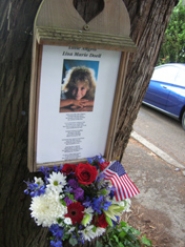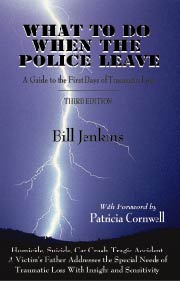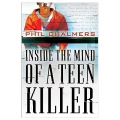| Lisa Doell |
| The following was written by Steve Doell in support of Measure 72, a referendum on the Oregon ballot on November 2, 1999.Read more about Steve’s award winning work to help crime victims and how he was honored by the National Crime Victims Law Institute.My personal experience is illustrative of how a single rogue juror can subvert justice.On October 21, 1992, my life was shattered forever. On that afternoon, a car drove onto the shoulder of a Lake Oswego street and struck my 12-year old daughter, Lisa, as she was walking to her grandparents’ house after school. The force of the impact hurled Lisa’s little body into a nearby tree. Rather than stop and call for help, the driver fled the scene. Lisa, my darling child, was already dead when a passing motorist discovered her mangled body. The only clue as to the identity of Lisa’s killer was a license plate found nearby.The police quickly traced the license plate to Andrew Whitaker. When confronted with the physical evidence, Whitaker admitted that Lisa’s death was not an accident. Whitaker confessed he killed Lisa “on purpose”. What initially appeared to be an open and shut case, turned into anything but The following is a statement made during a Town Hall television program by I sat on a murder jury 6 years ago and sat with 11 other people who were We went to deliberation and we talked for three days. We thought all of the |
Justice System Questioned in Girl’s Hit-Run Death
Hammons said Whitaker talked with a classmate, Matthew Dickman, that night.
“Andy talked about girls and how he had never kissed a girl,” Hammons said. “He also talked about impulses, and he said he saw a girl walking down the street and he had an impulse to stop and rape her.”
Was Whitaker the man who unnerved Lisa? It’s not known.
What is known is that shortly before 4 p.m. the next day, Lisa Doell died on North Shore Road. And about 4:15 p.m. that day, Dickman later testified, Whitaker drove to his house and said he just hit someone with his parents’ car.
Joy said Whitaker gave him the poem less than an hour before Lisa Doell’s death.
During jury selection, potential juror Betty Maxwell acknowledged that her son had been involved in an accident two decades before. But Deputy District Attorney Michael P. Regan allowed her on the panel; he was convinced that she could separate the two incidents.
The Andrew Whitaker who testified was not so confessional as the one police interviewed.
He testified that he was depressed and upset about personal problems as he drove home from high school the day of Lisa’s death.
“I remember seeing her, but I didn’t realize she was there,” he said. He said he did not speed up, swerve or put on his brakes. “I was scared.”
He said he told his schoolmates that he had given in to an impulse partly because “it seemed so unreal to me.”
And when he told police it wasn’t an accident, he was confused and merely trying to accept responsibility, Whitaker said.
“I was trying to tell him it was my fault,” he said. “My interpretation of an accident is where no one is at fault.”
The jury deliberated 16 hours over three days before convicting Whitaker on manslaughter charges. Two of the 12 jurors voted against a murder conviction, which must be unanimous; one of them was Maxwell, who later said she voted for acquittal because of her son’s experience and was sympathetic toward Whitaker.
The prosecutor, Regan, learned a sad lesson: “Now, knowing what I know, I probably won’t put anyone on (a jury) who has any kind of connection.”
Still, he does not think the system failed.
“I understand the strengths and weaknesses of the jury system,” he said. “We are witnessing one of the great weaknesses–that sometimes injustices occur. If I had to sit down and devise a better system, I could not do it.”
The Doell family is not so accepting.
“I wake up every morning and go, ‘Is Lisa really gone? Did someone really murder her? Did we really go through a criminal case and her murderer is being set free?”‘ said Lisa’s mother, Colleen Doell. “It’s just not real.”
Her ex-husband, Steve Doell, took his outrage over the verdict to the Oregon Legislature, which passed a bill making it harder for people who kill with automobiles to regain their driver’s licenses.
He still chokes up when talk turns to his daughter.
“It’s not been easy,” Doell said. “I’ve not only lost my daughter, I’ve lost my best friend too.”
Colleen Doell says she’s been so focused on the criminal aspect of her daughter’s death that she hasn’t had a chance to deal with the loss–and doesn’t know if she ever will.
“She didn’t walk into a room, she bounced into a room, she danced into a room,” Colleen Doell said. “It’s pretty quiet in our house now.”
‘Rights, justice and public safety’
By Cliff Newell
The Lake Oswego Review, Jul 28, 2010
New flowers adorn the memorial on North Shore Road for Lisa Doell, who died in October 1992 when a teen driver intentionally ran her down.
Every Fourth of July, Steve Doell always buys a bouquet of red, white and blue flowers and places them at a memorial on 319 North Shore Road in Lake Oswego.
“The Fourth of July was Lisa’s favorite holiday next to Christmas,” Doell said. “She had so much fun with it with her family, cousins and friends.”
But the Lake Oswego man does more than memorialize his daughter with some flowers. His whole life is a memorialization of her.
Doell, with his organization Crime Victims United, has been one of Oregon’s leading advocates for crime victims ever since the day 18 years ago when a teenage driver deliberately hit and killed 12-year-old Lisa Doell as she was walking from school to the home of her grandparents.
Doell’s impact has been so great that it would be fair to judge conditions for Oregon crime victims and their families as pre-Steve Doell and after-Steve Doell.
Just one indication of this was his honoring this past June with the Victim Advocate Award by the National Crime Victims Law Institute.
“They’re the leaders of the most prestigious institute for crime victims,” Doell said. “It was a huge honor, and I was very humbled by it. It was recognition of basically 15 years of work for crime victims’ rights, justice and public safety.”
Doell is a perfect example of the difference one person can make.
“Steve has had an impact on two or three different levels,” said Hardy Meyers, former Oregon attorney general. “I couldn’t even estimate the number of crime victims he has counseled. Through Crime Victims United he has promoted initiatives on public safety and victims’ rights.
“Steve has had an incredibly rich, active involvement in victims’ rights. Perhaps no one in state history has equaled him. He has an incredible record of dedication.”
“One of the biggest things Steve has done is be at the forefront of protecting the rights of survivors,” said Meg Garvin, executive director of the NCVLI.
“Steve has been one of the most effective advocates of victims’ rights inside or outside the legislature,” said state Sen. Richard Devlin, D-Tualatin, whose District 19 includes Lake Oswego. “Victims can count on him to be there for hearings and for three or four sit-down counseling sessions.”
Clackamas County Circuit Court Judge Susie Norby admitted that, 17 years ago when the office she worked in was prosecuting his daughter’s murderer, she thought she would never hear Steve Doell’s name again.
“I thought he was just another grieving father,” Norby said. “But instead of caving himself in with his own grief, he chose to go out into the world and help others.”
Doell has gained tremendous knowledge of the legal and political systems over 18 years, and he can also be rugged when pursuing what he believes to be right.
“Sometimes Steve takes controversial decisions,” Norby said. “But whether you like him or not or agree with him or not, everyone I know respects him. He is a real professional. He won’t get in your face. He tries to keep the debate going.”
Norby has a number of reasons to be grateful to Doell, including his endorsement of her candidacy for judge in 2006. But his work became even more meaningful to her when she herself was threatened with death in 2009.
“I spoke as a victim in my own courtroom,” Norby said. “Before the legislation Steve helped achieve, victims didn’t get to speak in the courtroom. It was important for me to look the man who had wished me dead right in the eye.”
The most significant milestone in Doell’s life came in October 1992 when his daughter Lisa — a little girl of extraordinary promise — was killed by 16-year-old Andrew Whitaker.
“Lisa’s body hit a tree at 45 miles per hour,” Doell said.
Whitaker confessed that he committed this act out of a desire to kill a young girl. He had no previous acquaintance with Lisa Doell. Whitaker was sentenced to 36 months in prison and served 28 months.
“I’m not concerned with where he is or what he is doing today,” Doell said. “What I’ve done is try to change laws and make it better for people who have followed in my footsteps.”
His crusade has changed Oregon. A brief recounting of Doell’s wide-ranging successes includes helping with the passage of Measures 51 and 52 (which removed the constitutional ban for victims appealing verdicts), changes in minimum mandatory sentences for first- and second-degree violent criminals and a huge drop in Oregon’s violent crime rate.
He also played a key role in advising Tiffany Edens when she testified against her rapist Richard Troy Gillmore, the “Jogger Rapist,” at his parole hearings in 2008 and 2010. Gillmore remains in prison.
“Oregon is now a better state and a safer state,” Doell said. “A lot of people have worked very hard to make sure Oregon is one of the safest states in the country.”
Despite his remarkable accomplishments, Doell will never rest on his laurels. Why is he still so motivated?
“Because there’s always work to do,” Doell said. “I just came from talking to a family whose sister was murdered at Gold Beach in 1987. She was 18 years old. She was out camping and was kidnapped. She was raped, shot to death and her car was stolen.
“The person who did it was given a life sentence. Now he’s coming up for parole. Now the family is reliving this thing and facing the possibility he will be released.
“I’m preparing them for the hearing — the impact on victims, media outreach, anything that is needed. Whatever it takes.”












